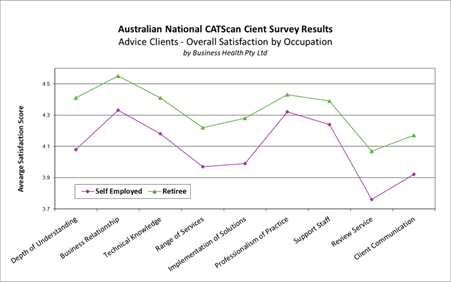Clients who are self-employed generally have different and more complex advice requirements and, as such, demands (our view) a differentiated approach from their adviser. Given the emergence of a whole new raft of SME and self-employed clients, we thought it appropriate to take a deeper dive into how advisers can deliver the service and experience these clients need and expect.
Why this is important, here’s what we know
A recent analysis of our Client Satisfaction Survey* data suggests that many advice practices may be struggling to satisfy their small business owners. As attractive as the self-employed market segment may seem, it certainly comes with challenges.
The following chart plots the satisfaction levels of small business owners versus those of retiree clients. It clearly shows that the self-employed clients are less satisfied with their adviser’s performance across nine key service delivery areas.

What do you know about your SME clients?
Drawing from our 2022 Future Ready IX** whitepaper, less than 10% of Australian practices are retaining sufficient data points to build meaningful client relationships. While technical data appears to be very well maintained and managed across the board, personal relationship-building information isn’t ie. wedding anniversary dates, children’s and grandchildren’s birthdays, charitable and community interests, client’s ‘bucket list’, favourite pastimes and so on.
This is where the advantage of a well-maintained, proactively managed CRM system truly comes to the fore! For SME clients, additional information pertinent to their business should also be collected and maintained ie. future plans, short and longer-term business goals, key milestones (anniversary of commencement etc), plans for succession, its latest valuation plus anything else that is important to the owner (your client).
CRM: garbage in, garbage out
To use the classic axiom, ‘garbage in, garbage out’ – for any business to have an accurate picture of their clients, they need to be regularly asking the types of questions which enable client relationships to be developed and maintained.
To ensure the effective capture of this information, we recommend advice firms develop a comprehensive client profile form, to be updated at every opportunity and maintained in the CRM.
When was the last time you sought feedback from your clients as to their satisfaction with you and your service?
In our experience, clients don’t care about how much you know, until they know how much you care.
According to the Future Ready IX analysis, just one in four practices (26%) have sought such input from their clients in the last two years, and unfortunately, most of these were conducted internally by the business itself. So, with hand on heart – how satisfied are your clients?
Differentiating your service for SME clients
We hope the following insights derived from our CATScan Client Survey research will provide a few pointers for you:
1: Time is a precious resource
SME owners are generally stretched to the limit running their own business and, as a result, they have less time to devote to managing their financial affairs – which is a key reason they are looking to advisers for help.
- Always be respectful of their time – make every minute you are engaged with them meaningful and valuable.
- Keep your communications succinct and to the point – be direct and explicit as to what you need them to do.
- Be flexible and accommodating – offer to meet outside of normal business hours (when they are busy serving their own clients) and look to leverage the benefits and convenience of video conferencing.
2: Close enough is not good enough
Given they spend their entire working day striving to deliver exceptional service to their own clients, small business owners can be far more demanding (and less forgiving) than employee or retiree clients. They often have higher expectations and are less tolerant of sub-standard service (as clearly shown in the CATScan Overall Satisfaction chart above).
- Ensure your back-office systems and processes can deliver on time, every time.
- Your client-facing staff have all the required skills and present as knowledgeable and professional.
- Under-promise and over deliver. It is imperative that you do what you say you are going to do when you say you are going to do it. And, if you do encounter difficulty with any deliverable, be proactive and positively manage any delays.
3: Review your solution suite
Self-employed clients usually have a wide range of needs and require advice across a number of different financial areas. Consequently, advisers may need to invest heavily in their education/qualification levels and continually look to broaden their level of expertise.
Expanding your solution suite to accommodate key person, buy/sell, transition and succession needs should also be on your ‘service radar’. Providing not only ‘fit for purpose’ products but also facilitating access to aligned professional services such as legal, taxation, accounting, estate planning and cyber protection expertise.
To reinforce the point – according to Business Health analysis, only 15% of advised SME business owners have a current buy/sell or business succession agreement.
4: Review your delivery platforms
Most small business owners are also quite tech-savvy and increasingly digital capable. They are accustomed to doing all manner of business over the internet and expect their adviser’s web presence and online capability to simplify their financial life and make their interactions easier.
5: Broaden your professional network
The needs of most small business owners extend well past the traditional product offerings of many practices. Self-employed clients often value referrals to other professional service providers (e.g. accountants, lawyers, general insurance brokers, lending/leasing suppliers, etc). A strong alliance/referral network is critical if advisers are planning to successfully target this market.
While it is generally not expected, any support, promotion or referrals you can provide to your small business owners is also very much appreciated.
6: Raise your profile – become a recognised expert
If your practice has the skills and knowledge to add real value to small business owners, ensure you promote this expertise widely.
Some ideas: put case studies on your website and in your client blogs or newsletters. Make yourself available as an expert commentator for radio, television or web streaming channels. Write a regular column for targeted trade publications or your local newspaper. Contribute articles that your referral partners can use with their self-employed clients and consider running joint webinars/seminars.
Also, make contact with the associations in your local area that support small businesses (e.g. Chamber of Commerce, Council of Small Business Organisations Australia and local business networking groups). Becoming actively involved in these groups is a quick and cost-effective way of lifting your profile.
7: Your Value proposition – your point of difference
Building from the previous point – facilitating a forum for discussion between your SME clients as to their experiences and ‘lessons learned’ in operating a small business. It’s always nice to hear from others who have experienced what you could be going through (as an owner) and, if the opportunity has been provided by your adviser – all the better. What a great value add!
This suggestion reminded us of a US practice which ran regular workshops for their SME clients who were close to retirement (and therefore sale, succession and transition were top of mind) – with the main speakers being past clients who had recently exited their business. Experiences being shared in a meaningful, tangible way! Love it!
For your consideration.
* CATScan Client Satisfaction Survey service
The CATScan dataset now contains feedback from over 60,000 Australian clients, all of whom are using the services of a financial adviser. As such, these findings are unique in the Australian advice marketplace and exclusive to Business Health.
** Future Ready
Since 2002, Business Health has released a series of white papers providing a comprehensive insight into the ‘health’ of the Australian advisory industry and its preparedness for the future. These papers have become known as the Future Ready analysis. The ninth in this series, Future Ready IX was released in 2022 and is based on the consolidated analysis from Business Health’s HealthCheck data warehouse.

